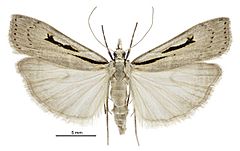Scoparia rotuella facts for kids
Scoparia rotuella is a small moth that lives only in New Zealand. It belongs to a group of moths called the Crambidae family. Scientists first described this moth in 1875.
Quick facts for kids Scoparia rotuella |
|
|---|---|
 |
|
| Female | |
| Scientific classification | |
| Kingdom: | |
| Phylum: | |
| Class: | |
| Order: | |
| Family: | |
| Genus: |
Scoparia
|
| Species: |
S. rotuella
|
| Binomial name | |
| Scoparia rotuella (C. Felder, R. Felder & Rogenhofer, 1875)
|
|
| Synonyms | |
|
|
Contents
Meet the Scoparia Rotuella Moth
The Scoparia rotuella is a type of moth. It is part of a large group of insects called Lepidoptera, which includes both moths and butterflies. This specific moth belongs to the Crambidae family.
Discovery and Naming
Three scientists, Cajetan Felder, Rudolf Felder, and Alois Friedrich Rogenhofer, first described this moth. They gave it its scientific name in 1875. At first, they called it Crambus rotuellus.
Later, in 1913, another scientist named Edward Meyrick studied the moth again. He decided it fit better into a different group, or genus, called Scoparia. So, its name became Scoparia rotuella.
Where the Moth Lives
This moth is special because it is endemic to New Zealand. This means you can only find Scoparia rotuella living naturally in New Zealand and nowhere else in the world. It is a unique part of New Zealand's wildlife.
What the Moth Looks Like
The Scoparia rotuella moth has a wingspan of about 28 to 29 millimeters. That's roughly the length of two standard paperclips side by side!
Its front wings are a light grayish-yellow color. They have tiny white speckles, especially near the front edge. A black stripe runs from the base of the wing to the middle. This stripe has clear yellowish-yellow edges.
There is also a sharp black line on the wing, also edged with yellowish-yellow. Closer to the wing's outer edge, you can see a row of black dots. The very edge of the wing has another row of black dots.
The back wings of the moth are a very pale grayish-yellow color.
When to See Them
Adult Scoparia rotuella moths have been seen flying in January. This suggests that this is the time of year when they are active.

